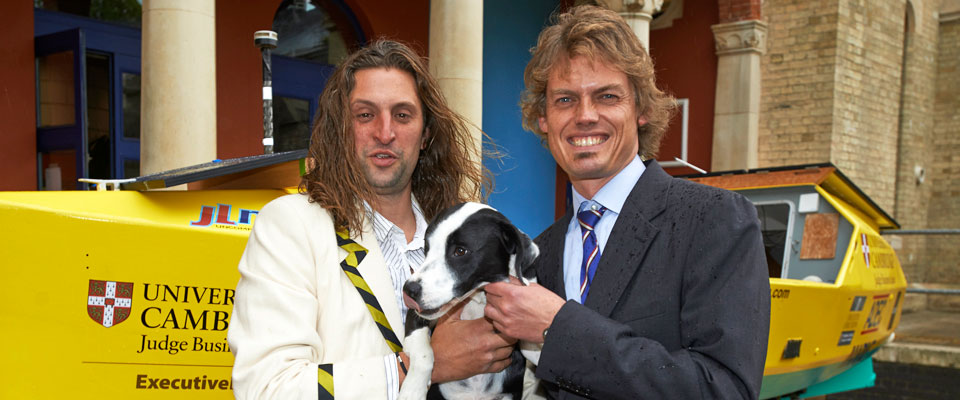
Having just returned from the tail-end of a marathon of pre-trip preparations - a three-day Hostile Environment Training course in this case - it's time to follow up on a promise made long ago: to write a blog.
Needless to say, Anton and I have taken out plenty time to discuss what matters most (and what doesn't) as we prepare to row the length of the named Amazon river, unsupported. Others have kayaked, swum, even walked, the length. One poor soul tried motoring his way through in a bathtub surrounded by empty oil barrels but never got beyond the Brazilian border. The authorities just wouldn't have it. Several brave individuals have traipsed as far back as the river's source; that, sadly, our ocean rowing boat would never manage. Food and water included, the damn thing weighs nearly a ton. But, as far as we can tell, no one has rowed it - especially not without a support crew.
We will be entirely self-sufficient. Solar panels will provide the juice necessarily to operate our iridium phone. Fishing kit will see us through our daily meals (and when it doesn't, our rations provide for). Plastic boxes of medical supplies will help take the edge off stupidity and parasite-inflicted ailments. Four cameras will record our changing moods and states of hygiene (at the request of BBC East).
The challenges are predictable. The Amazon ranks as one of malaria's hotspots and even the best meds won't necessarily prevent it. The region is full of parasites. There's the risk of dengue fever, of hyperthermia, of the usual creepies and crawlies. There's also the risk of running into one of zillions of chunks of debris floating down the river, and that of falling out and failing to patch up. We might face hostility from locals and, of course, will more likely than not be robbed of some of our luxuries. There's a chance we might be taken hostage (apparently the average period of being held is 30 days; the average ransom for this region £2,00l per head, and so long as it remains a commercial transaction there shouldn't be anything to worry about). We'd be stupid not to admit to being a little scared. But it'll be great fun too, and we're grateful to our corporate friends and colleagues for their financial and moral support.
Over the past few months, people have often asked us 'why?'. To this the answer is disarmingly simple: 'Why not?' Who wouldn't grasp for the chance to break with the tedium of everyday life, even if only for a couple of months? But there are other reasons too. There is, for example, an intellectual agenda behind this. Having studied teams of people in extraordinary situations over the past 15 years - including war surgeons, elite rowers, and improv comedians - it seemed about time to bite the bullet and put my observations to the test: What is it like to spend 45 to 60 days with one other human being on a small boat in the middle of nowhere? As times get rough, does our collective decision making get better or worse? What 'formulas' will Anton and I adopt to resolve differences, and with what consequence? Should, God forbid, we be taken hostage, how will we build relationships with 'the other'? What happens to people, like us, when pushed to what we think is the limits of ordinary sanity?
In fact, it might be interesting to use the trip to put some of my observations on social coordination to the test. Is what we think we know about teams (based not just on my work but, more importantly, on that emerging from social psychology labs at the world's best universities) useful? True? Complete? And while we're at it, why not make this the subject of the next few blog entries?
Tim Bellis, a friend and colleague, sent me the following a few days ago. It's a frank admission by cycling's Team Sky boss Sir Dave Brailsford:
"I don't spend a nanosecond worrying whether they get on ... People talk about having team unity and team harmony. I don't buy that at all. Most of the best teams I've been with, they're not harmonious environments.
"This is not a harmonious environment. This is a gritty environment where people are pushing really hard. What you need is goal harmony, and there's a big difference between the two."
(source: http://www.bbc.co.uk/sport/0/cycling/23415146)
Brailsford's observation echoes those on teams by Harvard's Nancy Katz and (sadly, the late) Richard Hackman. Too often people have assumed interpersonal harmony to be a cause for team performance, even if experimental evidence points in the opposite direction: how team members feel about each other is much more likely to be a consequence of performance than its cause. Thus the best way to settle conflict may not be a conversation but giving people something to do, something to feel good about. Katz observes that team leaders who, keen to maintain harmony, try hard to root out interpersonal rivalries are likely to do themselves a disservice. Our competitive nature got us where we are, and to disallow this is to deny an intrinsic feature of who we are as individuals. What is more likely to happen, she suggests, is that our competitive tendencies will be fought out in private, for example by belittling the efforts of those around us. God help us.
So how might all this work itself out between Anton and me? Given that it will be just the two of us on a boat - and presumably having to put up with each other's sickness for a fair share of the journey - it is of course important that we get along. However, it is more important yet that we find an effective way to resolve differences. What should help is the ability to make physical progress daily which, if things work according to plan, should give us something to feel good about collectively.
Aside from progress rowing-wise, however, it is critically important that we remember our mutual goal: to complete the journey and to do so in more or less the same shape as we started in. To that extent it is my job to make sure that, each day on waking, Anton is okay; and for Anton to do likewise. It will be important to understand each other's private ambitions as each of us will have multiple objectives, and for me to help Anton achieve his and for him to reciprocate the favour. Anton knows, for example, that I hope to produce a sensitive photo essay (on male intimacy ... which sounds worse than it is ☺) and it will be important for him to allow me free reign, even in dark moods. In turn, I am aware of his private ambitions and will do my utmost to help him achieve these.
To focus on objectives - not harmony - is, cutting edge research suggests, a more effective, and more robust, means towards a solid and successful row. Let's put it to the test ...


















Good luck and stay safe and happy.
Great write up and insights in to the competitive mindset! Good luck with the row and I hope everything goes on track!
That's a damn heavy boat to get past the rapids and mudbanks ... maybe some solar cells, batteries, and an electric wrench with a lot of rope may help ... having just gotten back from 5 days on a boat on the Amazon, good luck to you. By the way, piranha soup is great!!!